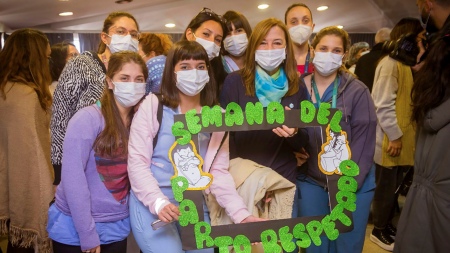The Buenos Aires government promulgated this Thursday the law that creates the Provincial Strategic Plan for Respected Childbirth, which will be complementary to the national law on Humanized Childbirth and which seeks to eradicate obstetric violence in stages, with awareness campaigns, visibility, gender training and in right for health teams.
The proposal, by deputy Marian Larroque (Frente de Todos), was sanctioned on November 29 by the Legislature and published this Thursday in the district’s official Gazette and indicates that “Respected and/or humanized Childbirth is considered at the request of execution of the rights of pregnant women and newborns during labor, delivery and the puerperium, respecting autonomy in making safe and informed decisions”.
“In it, respect for physiological processes, non-medicalization and care of childbirth as a sexual act must be ensured,” the initiative adds.
In addition, the standard states that The pregnant person has the right “to be considered, in their situation regarding the process of pregnancy, childbirth and the puerperium, as a healthy person and so that she is recognized as the protagonist of it”; and “to be informed by the health team in a clear and understandable way about the different medical interventions that could take place during labor, delivery and the puerperium”.
Also to be accompanied by a person you trust and choose during labor, delivery and postpartum“; Already be treated with respect by all the people involved in the care processand in an individual and personalized way, which guarantees privacy and accompaniment throughout the care process and takes into account their cultural guidelines”.
At the same time, they have the right “to a delivery that is respectful of subjective times, both physiological and psychological, avoiding in all cases invasive practices and the supply of medication that are not justified by the state of health of the pregnant person or the person for birth” and “to be informed about the evolution of their delivery, changes in obstetric behavior and the reasons, as well as about the condition of their son or daughter.
Other rights mentioned in the Law are “have your son or daughter by your side during the stay in the health facility, provided that the newborn or she herself does not require special care“; “not to be subjected to any examination or intervention whose purpose is research, except consent.”

“To receive advice and complete and clear information about the care of herself and the child” and “to receive clear and complete information about her sexual and reproductive rights and effective access to the contraceptive methods that she needs to use according to her wishes and needs, prior to discharge”, he continues.
In parallel, the Law determines whate the newborn person has the right “to be treated in a respectful and dignified manner”; “to his unequivocal identification”; “not to be subjected to any examination or intervention whose purpose is research or teaching, except consent”; “to joint hospitalization with the parent in the ward”; since “their parents receive adequate advice and information on care for their growth and development, as well as their vaccination plan.”
The Plan will be implemented in public, private and social security health establishments in the province of Buenos Aires.
In this way, the Provincial Strategic Plan for Respected Childbirth reaffirms the principles of Law No. 25,929 and proposes creating a table within the scope of the Buenos Aires Ministry of Health, which must articulate policies on the matter with the Ministry of Women, Gender Policies and Sexual Diversity, professional associations and colleges, civil society organizations, the scientific community and other actors.







